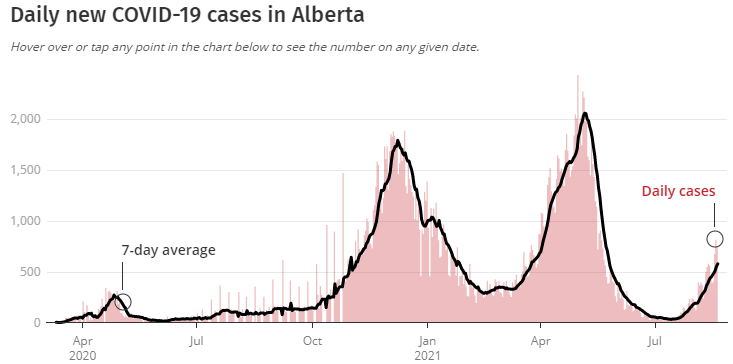
I'm going to go against the grain here and say a Liberal majority is more likely than not. (Yes I am acutely aware of what the polls and projections are saying).
There are a few environmental factors that are in play here that are worth flagging: (thread)
#cdnpoli
There are a few environmental factors that are in play here that are worth flagging: (thread)
#cdnpoli
1. The Liberal war room knows that their attacks are weaksauce and are probably annoyed that Twitter is mocking them. However, the headlines I'm seeing seem to indicate that the Liberal framing is still making its way into the press: (headlines about abortion, LGBTQ rights, etc)
2. The attacks force the CPC to be on the defensive, they have to respond to the attacks instead of establishing a narrative early (important!)
Why important? Few paying attention now, while in the background COVID cases are clearly on the rise.
Why important? Few paying attention now, while in the background COVID cases are clearly on the rise.
3. Everything the Liberals are doing is with the framing that they deserve a reward for their pandemic response, and the provinces dropped the ball (helps that 8/10 are now conservative-ish). Meanwhile, CPC and NDP are trying to convince it's not about the pandemic.
4. This framing will depend on the environmental factors: i.e. where are we with COVID management. Early indications seem to be that the cases are up-ticking at a rate more similar to Oct-Nov 2020 instead of Aug-Sept 2020. 

5. When we come back from Labour Day weekend and have debates, folks will start to pay attention again, and the media will put COVID as the backdrop again to every story. September to October is also the time for booster shots, so vaxx procurement will also be back in the news.
6. In sum, the environmental factors at play here help the Liberals more than they hurt, and I'm seeing little evidence of a counternarrative that's sticking. With a short campaign, the CPC and NDP absolutely need something by the end of next week, and I don't see it yet.
7. The polling numbers are bullish for the Liberals not necessarily in terms of the toplines, but two trends are worth noting:
Libs have a fairly comfortable lead among older voters, that ordinarily are more CPC-oriented. (Over 10% in some polls).
BQ support is trending down.
Libs have a fairly comfortable lead among older voters, that ordinarily are more CPC-oriented. (Over 10% in some polls).
BQ support is trending down.
8. Both of those trends are helpful in Quebec where there are the most opportunities to gain seats. Note that the Liberals are just 13 seats shy of a majority.
Even though Ontario is showing some tightening, this will be blown back open once COVID cases start to tick up more.
Even though Ontario is showing some tightening, this will be blown back open once COVID cases start to tick up more.
9. The main reason why the Liberals were denied a majority in 2019 was because of a relatively unforeseen BQ surge. The party was moribund in 2018-19 until resurrected by YFB in the TVA debate. Will that happen again? Who's to say, but the BQ bleed is helpful for the Libs.
10. The Liberals are winning this election, that much is pretty much certain. To me the question is more: did they call it too early? There are only 4 weeks between now and e-day. Will the 4th wave crest high enough to give the Libs their majority?
The goal for O'Toole here is to deny a majority, and that remains an uphill battle. If he can do that, then he'll have a good shot on more favourable terms in ~2023, but this talk that the CPC have a shot is nonsense. The LPC isn't naive--they know exactly what they're doing. Fin
• • •
Missing some Tweet in this thread? You can try to
force a refresh




